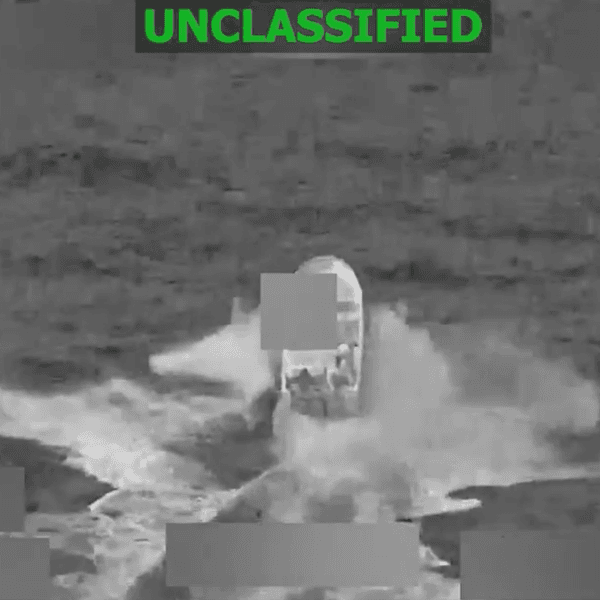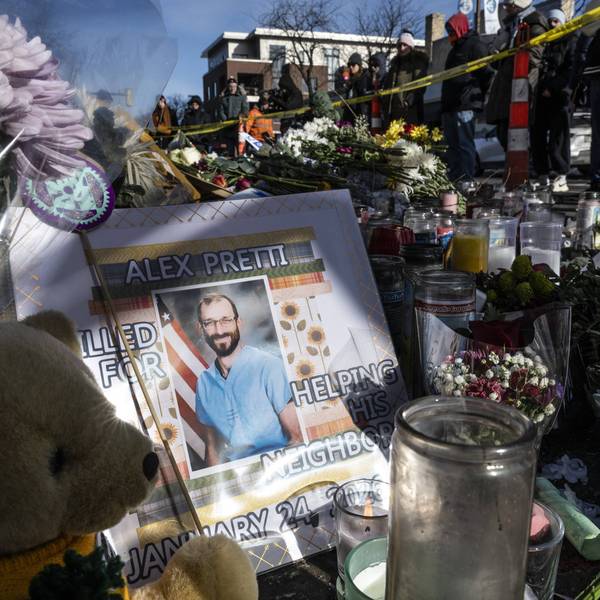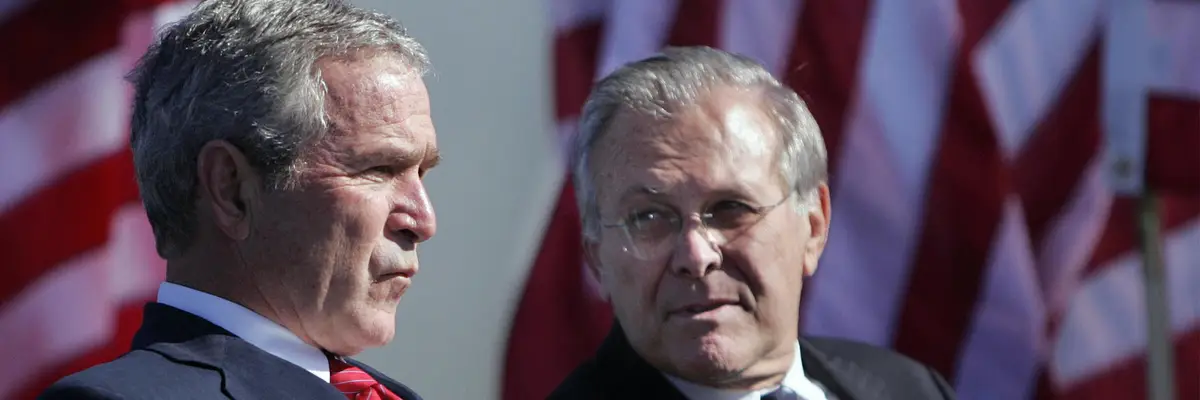Donald Rumsfeld, the former U.S. congressman, aide to several Republican presidents, and two-time defense secretary whose torture-laden tenure and ruinous legacy were defined by his lies in service of an unending war that's killed at least hundreds of thousands of people, died Tuesday at age 88.
"Donald Rumsfeld is responsible for thousands and thousands of deaths and enriching himself in the process. The least we can do is to forever link his name with 'war criminal.'"
--Veterans for Peace
By the time he was chosen as then-President George W. Bush's secretary of defense, Rumsfeld had already been a Navy veteran, four-term Republican U.S. congressman, and adviser to former Presidents Richard Nixon and Gerald Ford--for whom he had served as defense secretary.
In the early 1980s, President Ronald Reagan repeatedly dispatched Rumsfeld as a special envoy to Iraq, whose brutal dictator Saddam Hussein was at the time an important U.S. ally. An infamous handshake between Rumsfeld and Hussein led to the transfer of deadly chemical and biological materials from the U.S. and allies to Iraq. Hussein subsequently weaponized the components and unleashed weapons of mass destruction on both Iranian troops--with the assistance of the Reagan administration--and Iraqi Kurds during the genocidal (pdf) Anfal campaign.
As Bush's defense secretary, Rumsfeld--who served as CEO or chairman of companies including General Instrument and Gilead Sciences--recruited an inner circle of former corporate executives to oversee Pentagon operations, including Air Force Secretary James G. Roche (Northrop Grumman), Navy Secretary Gordon England (General Dynamics), and Army Secretary Thomas E. White (Enron). So great was the influence of the arms industry in the department during Rumsfeld's tenure that one commentator described it as "Department of Defense, Inc."
An ardent imperialist, Rumsfeld was a leading luminary of the neoconservative movement and a prominent leader of the Project for the New American Century (PNAC), whose other members included Bush administration officials such as Dick Cheney, John Bolton, Elliott Abrams, and Paul Wolfowitz.
PNAC hawks--who envisioned and strategized regime change in Iraq and elsewhere even before 9/11--lobbied vigorously for the 2003 invasion of Iraq, even though they knew the country had no connection with the September 11, 2001 attacks on the U.S. or weapons of mass destruction. When pressed on this last point, Rumsfeld offered perhaps his most infamous explanation:
As we know, there are known knowns; there are things we know we know. We also know there are known unknowns; that is to say we know there are some things we do not know. But there are also unknown unknowns--the ones we don't know we don't know.
In the rushed run-up to invade Iraq, Rumsfeld dutifully disseminated Bush administration lies about Hussein's nonexistent nuclear program, while laughably asserting that the Iraq invasion had "literally nothing to do with oil."
The invasion of Iraq, at first called Operation Iraqi Liberation (OIL) began in the dark of night with a Navy SEAL raid on two offshore Iraqi oil platforms. The New York Times--which parroted many of the administration's Iraq lies--hailed this as the first "victory in the battle for Iraq's vast oil empire."
"Five days or five weeks or five months, but it certainly isn't going to last any longer than that."
--Donald Rumsfeld, on how long the Iraq War would last
Rumsfeld predicted a quick and easy war in Iraq. "Five days or five weeks or five months, but it certainly isn't going to last any longer than that," he declared in November 2002 with cocksure miscalculation. Although former President Barack Obama officially ended the Iraq War in December 2011, U.S. troops are still stationed there today--and President Joe Biden bombed the country earlier this week.
When U.S. forces conquered Baghdad, one of the first sites they secured was the Oil Ministry headquarters. Meanwhile, the Iraqi National Museum, which housed priceless ancient artifacts spanning Mesopotamia's 5,000-year history, was being looted. Thousands of statues, manuscripts, and countless other treasures, some of them among the oldest objects created by civilized humans, were stolen while nearby U.S. troops did nothing.
"Stuff happens," Rumsfeld flippantly replied when faced with images of the looting. "The images you are seeing on television you are seeing over and over, and it's the same picture of some person walking out of some building with a vase, and you see it 20 times, and you think, 'My goodness, were there that many vases? Is it possible that there were that many vases in the whole country?'"
Thousands of U.S. troops would die during the course of the U.S.-led invasion and occupation of the country, along with hundreds of thousands of Iraqis. The latter were practically ignored by Bush officials. When Rumsfeld was asked why the public only hears about the number of American war dead and not about Iraqi casualties, he cooly replied that "we don't do body counts on other people."
Rumsfeld was also an instrumental figure in the Bush administration's torture program. He signed off on torture techniques used by U.S. troops at Guantanamo Bay, Abu Ghraib, and elsewhere--places where prisoners were sometimes tortured to death. He also issued a directive allowing torturers to withhold medical care to prisoners under interrogation who had injuries as serious as gunshot wounds. Later, Rumsfeld would require doctors to certify that detainees slated for torture were certified "medically and operationally" fit for abuse.
When the Abu Ghraib torture photo scandal broke, Rumsfeld--after outing the courageous soldier who exposed the abuse--lied about what he knew.
Gen. Antonio Taguba, author of an Army report (pdf) on U.S. torture at Abu Ghraib, said he met with Rumsfeld and other Pentagon brass just before the defense secretary testified to the Senate about abuse at the notorious prison. Taguba, who had seen thousands of photos of detainee abuse, says Rumsfeld asked him if what was happening in the Iraqi prison was abuse or torture.
"I described a naked detainee lying on the wet floor, handcuffed, with an interrogator shoving things up his rectum and said: 'That's not abuse. That's torture.' There was quiet,'" the general recalled.
Yet Rumsfeld testified before the Senate that nobody in the Pentagon had seen the Abu Ghraib torture photos.
However, a Senate Armed Services Committee investigation concluded that "Rumsfeld's authorization of interrogation techniques... was a direct cause of detainee abuse."
The senators additionally asserted that it was "unconscionable and false" for leading Bush officials to blame a "few bad apples" in the military for detainee abuse in order to avoid accountability.
While fighting a war purportedly meant to defeat terrorism in some parts of the world, Rumsfeld supported terror elsewhere. Pursuing allies in the so-called War on Terror, Rumsfeld courted dictators including Uzbekistan's Islam Karimov--who boiled political opponents alive--and the Iranian exile militants Mujahedin-e Khalq (MEK), a State Department-designated terrorist organization.
"On the bright side, Donald Rumsfeld gets to shake hands once again with Saddam Hussein AND Nixon."
--John Fugelsang, comedian
Meanwhile, a Senate Foreign Relations Committee report concluded that Rumsfeld let bin Laden escape in December 2001. The report also said Rumsfeld's failures ultimately left Americans more vulnerable to terrorism.
It wasn't as if Rumsfeld did not understand the real root causes of anti-U.S. terrorism. In 2004, he commissioned a task force to study the subject. It concluded that "Muslims do not 'hate our freedom,' but rather, they hate our policies." The task force report cited "American direct intervention in the Muslim world," U.S. support for dictators in countries including Saudi Arabia and Egypt, and, most of all, "the American occupation of Iraq and Afghanistan."
Yet Rumsfeld remained an unrepentant cheerleader for war and empire until the end. Medea Benjamin, the co-founder of the women-led peace group CodePink who famously confronted the former defense secretary over his war crimes, tweeted that "his legacy of wars in Iraq and Afghanistan lives on."
"Donald Rumsfeld was a merciless war criminal who presided over systemic torture, massacres of civilians, [and] illegal wars," tweeted journalist and The Intercept co-founder Jeremy Scahill. "That's his legacy and how he should forever be remembered."
Daily Beast senior national security correspondent Spencer Ackerman wrote, "The only thing tragic about the death of Donald Rumsfeld is that it didn't occur in an Iraqi prison."
"Do not mourn the defense secretary," said Ackerman. "Mourn his victims. There were nearly too many to tally, but his Pentagon refused to count anyway."




